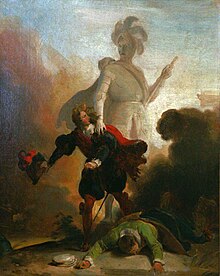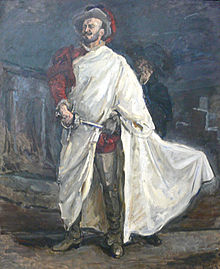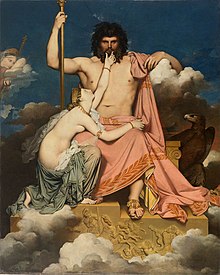Don Juan (Byron)

To laugh at all things — for I wish to know
What, after all, are all things — but a show?
Don Juan (1818–1824) is a long, digressive satiric poem by Lord Byron, based on the legend of Don Juan, which Byron reverses, portraying Juan not as a womaniser but someone easily seduced by women. It is a variation on the epic form. Unlike the more tortured early romantic works by Byron, exemplified by Childe Harold's Pilgrimage, Don Juan has a more humorous, satirical bent. Modern critics generally consider it to be Byron's masterpiece. The poem was never completed upon Byron's death in 1824.
Dedication
[edit]
- Explaining Metaphysics to the nation —
I wish he would explain his explanation.- Dedication, st. 2 (on Samuel Taylor Coleridge).
Canto I (1818)
[edit]
That all the Apostles would have done as they did.
- Brave men were living before Agamemnon.
- Stanza 5; comparable to "Vixerunt fortes ante Agamemnona / Multi", Horace, Ode iv, 9, 25.
- In vitues nothing earthly could surpass her,
Save thine "incomparable oil," Macassar!- Stanza 17.
- But — Oh! ye lords of ladies intellectual,
Inform us truly, have they not hen-peck'd you all?- Stanza 22.
- The languages, especially the dead,
The sciences, and most of all the abstruse,
The arts, at least all such as could be said
To be the most remote from common use.- Stanza 40.
- She, in sooth,
Possess'd an air and grace by no means common:
Her stature tall — I hate a dumpy woman.- Stanza 61.
- What men call gallantry, and gods adultery,
Is much more common where the climate's sultry.- Stanza 63.
- Christians have burnt each other, quite persuaded
That all the Apostles would have done as they did.- Stanza 83.
- A little still she strove, and much repented
And whispering 'I will ne'er consent' — consented.- Stanza 117.
- 'Tis sweet to hear the watch-dog's honest bark
Bay deep-mouth'd welcome as we draw near home;
'Tis sweet to know there is an eye will mark
Our coming, and look brighter when we come.- Stanza 123.
- Sweet is revenge — especially to women.
- Stanza 124.
- Pleasure's a sin, and sometimes sin's a pleasure.
- Stanza 133.
- And truant husband should return, and say,
"My dear, I was the first who came away".- Stanza 141.
- Man's love is of man's life a thing apart,
'Tis woman's whole existence.- Stanza 194.
- In my hot youth, when George the Third was king.
- Stanza 212.
- So for a good old-gentlemanly vice
I think I must take up with avarice.- Stanza 216; comparable to "That disease / Of which all old men sicken,—avarice", Thomas Middleton, The Roaring Girl (1611), Act i, Scene 1.
- What is the end of fame? 'T is but to fill
A certain portion of uncertain paper.- Stanza 218.
Canto II (1819)
[edit]- At leaving even the most unpleasant people
And places, one keeps looking at the steeple.- Stanza 14.
- There's nought, no doubt, so much the spirit calms
As rum and true religion.- Stanza 34.
- A solitary shriek, the bubbling cry
Of some strong swimmer in his agony.- Stanza 53.
- If this be true, indeed,
Some Christians have a comfortable creed.- Stanza 86.
- That Pasiphaë promoted breeding cattle,
To make the Cretans bloodier in battle.
For we all know that English people are
Fed upon beef—I won't say much of beer,
Because 't is liquor only, and being far
From this my subject, has no business here;
We know, too, they very fond of war,
A pleasure—like all pleasures—rather dear;
So were the Cretans—from which I infer
That beef and battles both were owing to her.- Stanza 155-6.
- All who joy would win
Must share it,—happiness was born a twin.- Stanza 172.
- Let us have wine and women, mirth and laughter,
Sermons and soda water the day after.- Stanza 178.
- A long, long kiss,—a kiss of youth and love.
- Stanza 186.
- Alas, the love of women! it is known
To be a lovely and a fearful thing.- Stanza 199.
Canto III (1821)
[edit]- In her first passion woman loves her lover:
In all the others, all she loves is love.- Stanza 3; comparable to "Dans les premières passions les femmes aiment l'amant, et dans les autres elles aiment l'amour", Francis, Duc de La Rochefoucauld, Maxim 471.
- Think you, if Laura had been Petrarch's wife,
He would have written sonnets all his life?- Stanza 8.
- All tragedies are finish'd by a death,
All comedies are ended by a marriage.
- He was the mildest-mannered man
That ever scuttled ship or cut a throat.- Stanza 41.
- Even good men like to make the public stare.
- Stanza 81.
- But words are things, and a small drop of ink,
Falling like dew, upon a thought, produces
That which makes thousands, perhaps millions, think- Stanza 88.
- The isles of Greece, the Isles of Greece!
Where burning Sappho loved and sung,
Where grew the arts of war and peace,
Where Delos rose, and Phoebus sprung!
Eternal summer gilds them yet,
But all, except their sun, is set.- Stanza 86-1 (The Isles of Greece, Stanza 1).
- The mountains look on Marathon —
And Marathon looks on the sea;
And musing there an hour alone,
I dream'd that Greece might still be free.- Stanza 86-3 (The Isles of Greece, Stanza 3).
- And where are they? and where art thou,
My country? On thy voiceless shore
The heroic lay is tuneless now —
The heroic bosom beats no more!
And must thy lyre, so long divine,
Degenerate into hands like mine?- Stanza 86-5 (The Isles of Greece, Stanza 5).
- Earth! render back from out thy breast
A remnant of our Spartan dead!
Of the three hundred grant but three,
To make a new Thermopylae!- Stanza 86-7 (The Isles of Greece, Stanza 7).
- You have the Pyrrhic dance as yet,
Where is the Pyrrhic phalanx gone?
Of two such lessons, why forget
The nobler and the manlier one?
You have the letters Cadmus gave —
Think ye he meant them for a slave?- Stanza 86-10 (The Isles of Greece, Stanza 10).
- Place me on Sunium's marbled steep,
Where nothing, save the waves and I,
May hear our mutual murmurs sweep;
There, swan-like, let me sing and die:
A land of slaves shall ne'er be mine —
Dash down yon cup of Samian wine!- Stanza 86-16 (The Isles of Greece, Stanza 16).
- But words are things, and a small drop of ink,
Falling like dew upon a thought, produces
That which makes thousands, perhaps millions, think.- Stanza 88.
- Ah, surely nothing dies but something mourns.
- Stanza 108.
Canto IV (1821)
[edit]
In poesy, unless perhaps the end…

'T is that I may not weep…

Unless it were to be a moment merry —
A novel word in my vocabulary.
Nothing so difficult as a beginning
In poesy, unless perhaps the end;
For oftentimes when Pegasus seems winning
The race, he sprains a wing, and down we tend,
Like Lucifer when hurled from Heaven for sinning;
Our sin the same, and hard as his to mend,
Being Pride, which leads the mind to soar too far,
Till our own weakness shows us what we are.But Time, which brings all beings to their level,
And sharp Adversity, will teach at last
Man, — and, as we would hope, — perhaps the Devil,
That neither of their intellects are vast:
While Youth's hot wishes in our red veins revel,
We know not this — the blood flows on too fast;
But as the torrent widens towards the Ocean,
We ponder deeply on each past emotion.- St. 1 & 2.
As boy, I thought myself a clever fellow,
And wished that others held the same opinion;
They took it up when my days grew more mellow,
And other minds acknowledged my dominion:
Now my sere Fancy "falls into the yellow
Leaf," and Imagination droops her pinion,
And the sad truth which hovers o'er my desk
Turns what was once romantic to burlesque.And if I laugh at any mortal thing,
'T is that I may not weep; and if I weep,
'T is that our nature cannot always bring
Itself to apathy, for we must steep
Our hearts first in the depths of Lethe's spring,
Ere what we least wish to behold will sleep:
Thetis baptized her mortal son in Styx;
A mortal mother would on Lethe fix.- St. 3 & 4.
- Some have accused me of a strange design
Against the creed and morals of the land,
And trace it in this poem every line:
I don't pretend that I quite understand
My own meaning when I would be very fine;
But the fact is that I have nothing planned,
Unless it were to be a moment merry —
A novel word in my vocabulary.- St. 5.
- The precious porcelain of human clay.
- Stanza 11; comparable to "This is the porcelain clay of humankind", John Dryden, Don Sebastian, Act i, Scene 1.
- Perhaps the early grave
Which men weep over may be meant to save.- Stanza 12.
- "Whom the gods love die young", was said of yore.
- Stanza 12; comparable to "The good die first, / And they whose hearts are dry as summer dust / Burn to the socket", William Wordsworth, The Excursion, Book i.
- Cf. Menander, [Epigramatic] Sentences, 425; The Double Deceiver, frag. 4.
- And her face so fair
Stirr'd with her dream, as rose-leaves with the air.- Stanza 29; comparable to "All her innocent thoughts / Like rose-leaves scatter'd", John Wilson, On the Death of a Child (1812).
- These two hated with a hate
Found only on the stage.- Stanza 93.
- "Arcades ambo,"—id est, blackguards both.
- Stanza 93.
- I've stood upon Achilles' tomb,
And heard Troy doubted; time will doubt of Rome.- Stanza 101.
- Oh! "darkly, deeply, beautifully blue,"
As someone somewhere sings about the sky.- Stanza 110.
Canto V (1821)
[edit]- There's not a sea the passenger e'er pukes in,
Turns up more dangerous breakers than the Euxine.- Stanza 5.
- But all have prices,
From crowns to kicks, according to their vices.- Stanza 27.
- And puts himself upon his good behaviour.
- Stanza 47.
- No Method's more sure at moments to take hold
Of the best feelings of mankind, which grow
More tender, as we every day behold,
Than that all-softening, overpowering knell,
The tocsin of the soul — the dinner-bell.- Stanza 49.
- There was no end unto the things she bought,
Nor to the trouble which her fancies caused;
Yet even her tyranny had such a grace,
The women pardon'd all except her face.- Stanza 113.
Canto VI (1823)
[edit]- Heroic, stoic Cato, the sententious,
Who lent his lady to his friend Hortensius.- Stanza 7.
- Polygamy may well be held in dread,
Not only as a sin, but as a bore:
Most wise men, with one moderate woman wed,
Will scarcely find philosophy for more.- Stanza 12.
- A lady of "a certain age," which means
Certainly aged.- Stanza 69.
- A "strange coincidence," to use a phrase
By which such things are settled nowadays.- Stanza 78.
Canto VII (1823)
[edit]- But ne'ertheless I hope it is no crime
To laugh at all things — for I wish to know
What, after all, are all things — but a show?- Stanza 2.
Canto VIII (1823)
[edit]- The drying up a single tear has more
Of honest fame than shedding seas of gore.- Stanza 3.
- Not so Leonidas and Washington,
Whose every battle-field is holy ground,
Which breathes of nations saved, not worlds undone.- Stanza 5.
- Thrice happy he whose name has been well spelt
In the despatch: I knew a man whose loss
Was printed Grove, although his name was Grose.- Stanza 18.
Canto IX (1823)
[edit]- At least he pays no rent, and has best right
To be the first of what we used to call
'Gentlemen farmer' — a race worn out quite,
Since lately there have been no rents at all,
And 'gentlemen' are in a piteous plight,
And 'farmers' can't raise Ceres from her fall.- Stanza 32.
- As fall the dews on quenchless sands,
Blood only serves to wash Ambition's hands!- Stanza 59.
- What a strange thing is man! and what a stranger
Is woman!- Stanza 64.
Canto X (1823)
[edit]- When Newton saw an apple fall, he found
In that slight startle from his contemplation
A mode of proving that the earth turn'd round
In a most natural whirl, called "gravitation."- Stanza 1.
- And wrinkles, the damned democrats, won't flatter.
- Stanza 24.
- Oh for a forty-parson power!
- Stanza 34.
Canto XI (1823)
[edit]- When Bishop Berkeley said 'there was no matter,'
And proved it — 'twas no matter what he said.- Stanza 1; comparable to "What is mind? No matter. What is matter? Never mind", T. H. Key (once Head Master of University College School), reported by F. J. Furnivall
- And, after all, what is a lie? 'Tis but
The truth in masquerade.- Stanza 37.
- 'Tis strange the mind, that very fiery particle,
Should let itself be snuff'd out by an article.- Stanza 60 (of John Keats).
Canto XII (1823)
[edit]- Ready money is Aladdin's lamp.
- Stanza 12.
Canto XIII (1823)
[edit]- Now hatred is by far the longest pleasure;
Men love in haste, but they detest at leisure.- Stanza 6.
- Of all tales 't is the saddest,—and more sad,
Because it makes us smile.- Stanza 9.
- Cervantes smiled Spain's chivalry away.
- Stanza 11.
- The English winter — ending in July,
To recommence in August.- Stanza 42.
- Society is now one polish'd horde,
Form'd of two mighty tribes, the Bores and Bored.- Stanza 95.
- All human history attests
That happiness for man — the hungry sinner! —
Since Eve ate apples, much depends on dinner.- Stanza 99; comparable to "For a man seldom thinks with more earnestness of anything than he does of his dinner", Piozzi, Anecdotes of Samuel Johnson, p. 149.
- And such is victory, and such is Man!
At least nine tenths of what we call so; —God
May have another name for half we scan
As human beings, or his ways are odd."- Stanza 104.
Canto XIV (1823)
[edit]- Of all the horrid, hideous notes of woe,
Sadder than owl-songs or the midnight blast,
Is that portentous phrase, I told you so.- Stanza 50.
- 'Tis strange, — but true; for truth is always strange;
Stranger than fiction.- Stanza 101.
Canto XV (1824)
[edit]- The Devil hath not, in all his quiver's choice,
An arrow for the heart like a sweet voice.- Stanza 13.
- A lovely being, scarcely formed or moulded,
A rose with all its sweetest leaves yet folded.- Stanza 43.
- But if a writer should be quite consistent,
How could he possibly show things existent?- Stanza 87.
Canto XVI (1824)
[edit]- The antique Persians taught three useful things —
To draw the bow, to ride, and speak the truth.- Stanza 1.
Canto XVII (1824)
[edit]- But not to go too far, I hold it law,
That where their education, harsh or mild,
Trangresses the great bounds of love or awe,
The sufferers — be't in heart or intellect —
Whate'er the cause, are orphans in effect.- Stanza 2.
- Great Galileo was debarr'd the Sun
Because he fix'd it; and, to stop his talking,
How Earth could round the solar orbit run,
Found his own legs embargo'd from mere walking:
The man was well-nigh dead, ere men begun
To think his skull had not some need of caulking;
But now, it seems, he's right — his notion just:
No doubt a consolation to his dust.- Stanza 8.
External links
[edit] Encyclopedic article on Don Juan (Byron) on Wikipedia
Encyclopedic article on Don Juan (Byron) on Wikipedia Works related to Don Juan (Byron, versions) on Wikisource
Works related to Don Juan (Byron, versions) on Wikisource Media related to Don Juan (poem) on Wikimedia Commons
Media related to Don Juan (poem) on Wikimedia Commons
